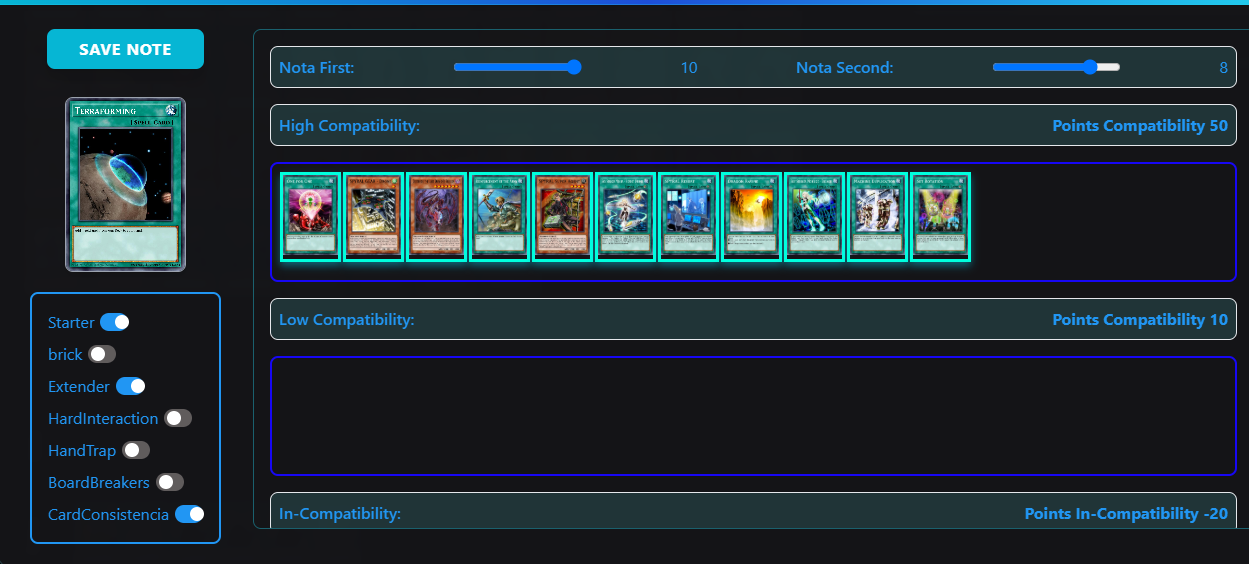It’s Time to...
Master infinite possibilities and Obliterate your opponents.
Next-gen deck builder for card games with advanced statistical analysis
Build Like a Pro. Question Like a Scientist.
Small decisions change everything. Before testing your deck in a duel, test your assumptions.
My deck is good… but sometimes it just feels like luck isn’t on my side.
Maybe the problem isn’t luck, but a lack of understanding of your deck’s real probabilities. Discover what’s hidden between the lines of the math.
“I always swear my bad hand was just bad luck...”
But was it really? The repetition of these ‘accidents’ might be revealing patterns you haven’t noticed yet.
“What’s the real impact of changing a single copy of a card in your deck?”
Sometimes, a single change can shift the entire dynamic. Knowing the true impact of each card is what separates a good deck from a consistent one.
“The perfect combination of cards almost never comes...”
The problem might not be the combination itself, but how it interacts with the rest of the deck. Not every synergy is statistically viable.
“I built my deck based on feeling.”
Drawing inspiration is great. But making decisions based on data is what gives you a real advantage in the duel.
“I’m not sure if it's better to have 2 or 3 copies of that key card...”
But more isn’t always better. There are objective ways to understand the effect of each variation before leaving it to chance.
A New Experience in Deck Building

Discover How to Become Truly Competitive

Impact Analysis
Analyze, through intuitive graphs, the real impact of the number of copies of a card on your deck's performance. The platform dynamically simulates different scenarios — such as hands with 5 or 6 cards — and generates sensitivity graphs that reveal how percentage variations in the number of copies (more or fewer) affect the chances of drawing the card and the overall performance of the deck. An essential tool to make decisions based on data, not guesswork.

Simultaneously analyze multiple scenarios.
Run parallel simulations of different versions of your deck with variations such as maximum and minimum copies, and hands with 5 or 6 cards. Evaluate, in real-time, the probability of specific groups of cards appearing — for example, a card from group A combined with another from group B — across multiple configurations. Even if the user defines a 40-card deck, the platform tests up to 60 cards in multiple scenarios, using different statistical methods such as Monte Carlo, exclusion/inclusion, and other advanced techniques for in-depth analysis.

Defining Card Groups and Their Compatibilities
Classify each card in your deck according to its function (Starter, Brick, Consistency Card, etc.) and define its compatibility with other cards — high, low, null, or incompatible. This structure allows you to accurately visualize how each card interacts with the rest of the deck, providing a comprehensive view of the synergy between elements and helping to identify potential bottlenecks or optimization opportunities.

Massive Hand Generation and Statistical Analysis of Scores
Generate Thousands of Hands Automatically
Using card scores and their synergies, the platform simulates thousands of hands, scoring each one individually and as a whole. It identifies frequency patterns (Brick, Starter, etc.), calculates hand quality, and classifies them (Excellent, Bad, Intermediate). The result includes win/loss probability estimates based on overall hand performance.
No More Theories. Test. Prove. Evolve.
This is not just a deck-building tool — it’s the bridge between intuition and evidence. A platform built for those who take Yu-Gi-Oh! seriously and want to make decisions based on real data, deep simulations, and applied statistics.
- 🔍 Visualize the real impact of each card and each copy.
- 📊 Compare multiple scenarios simultaneously, with up to 60 cards.
- 🧠 Evaluate real synergies between card groups and functions like Starter, Brick, Extender.
- 🎯 Generate 300 hands, analyze their distribution, score, and consistency with statistical backing.
- 📈 Make decisions based on data, not guesswork or isolated experiences.
- ✨ All of this in a beautiful, visual, no-code interface. Designed for you.
Plans & Access
- ✔Advanced deck building with intuitive interface
- ✔Unlimited hand and scenario simulation
- ✔Detailed statistics and exportable reports
- ✔Unlimited decks and folder organization
- ✔Priority support via chat and email
- ✔First access to updates and new features
- ✔Advanced probability analysis tool
- ✔Import and export decks in multiple formats
- ✔Dark mode and visual customization
- ✔Automatic cloud backup
- ✔Everything from Pro
- ✔AI to chat with your decks
- ✔Support for multiple card games
- ✔Browser-based games and tournaments
- ✔Earn rewards by playing (Millennium Project)
- ✔Early access to new features
“The platform is not supported on mobile and is intended for desktop use only due to the complexity of the functionalities.
This is an educational product aimed at a community focused on mathematical analysis in card games, not affiliated with or making any reference to specific card games as part of the product. The deck-building part is an additional feature based on a hypergeometric calculator with functionalities adjusted to use example images.”
7-Day Money-Back Guarantee
Try our service completely risk-free for 7 days. If you're not fully satisfied, we’ll refund you—no questions asked.
